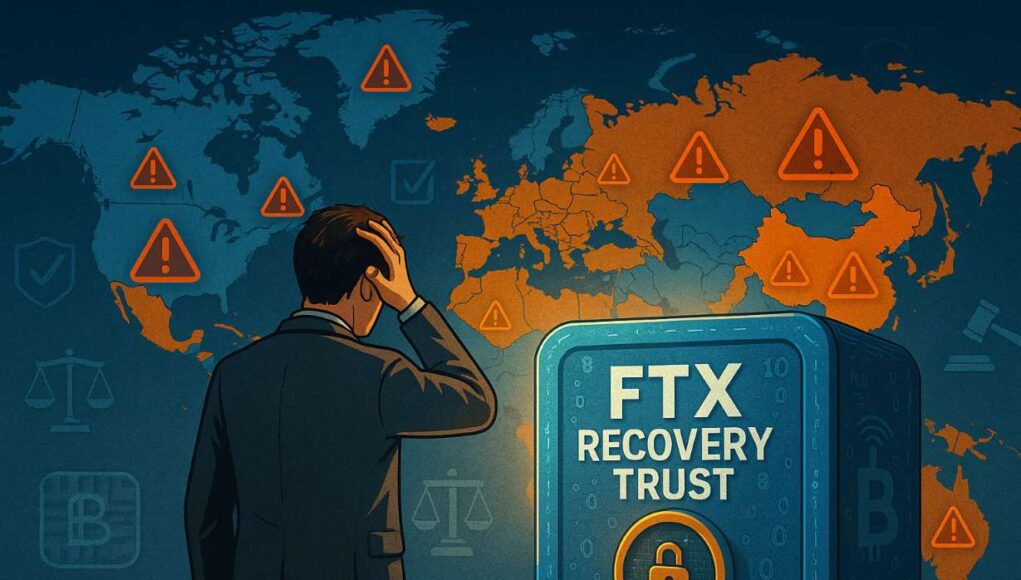The FTX Recovery Trust has frozen more than $500 million in creditor payouts across 49 countries. The Trust cited regulatory and legal compliance concerns. The affected jurisdictions, ranging from China and Russia to parts of Africa and the Middle East, have been flagged as crypto-restricted, either due to outright bans or insufficient regulatory clarity. The freeze has sparked a surge of legal and political backlash, particularly from Chinese FTX creditors. It also raised questions about the future of cross-border crypto payouts in cases of insolvent exchanges.
A Regulatory Minefield
At the heart of the FTX creditor payout freeze lies a complex mesh of compliance obligations. The FTX Recovery Trust stated that it cannot process claims in countries that lack adequate KYC or AML safeguards, or where crypto is outright banned. This includes a wide array of crypto-restricted jurisdictions, many of which are also subject to U.S. or international sanctions.
Jurisdictions impacted include not only China and Russia, but also Iran, Syria, Afghanistan, Belarus, and several African nations. According to the Trust, proceeding with payouts in these regions would risk violating international compliance standards. It might even break the law in some cases. The Trust has also flagged risks of violating sanctions by transacting in crypto markets of sanctioned countries, further complicating the legal landscape for repayment.
The situation underscores a critical paradox in crypto’s evolution: while the industry prides itself on borderless finance, insolvency proceedings like these must operate squarely within national legal frameworks. FTX’s administrators insist that halting repayments in these areas is a legal necessity, not an optional policy.
>>> Read more: FTX Recovery Trust Commences $5B Repayment in Stablecoins
Global Backlash from Frozen Creditors
While FTX frames the freeze as a compliance-driven safeguard, the move has not gone unchallenged, particularly in China. More than 500 Chinese FTX creditors have formally contested the decision. They allege discrimination and a lack of transparency in how jurisdictions were selected.
Many of these creditors argue that they complied with platform requirements when initially depositing funds. But now they face blocked crypto repayments through no fault of their own. The lack of a detailed timeline or appeals process compounds their frustrations.
The backlash has also spread beyond China. In countries like Nigeria, Venezuela, and Lebanon, where crypto often serves as a hedge against inflation or currency controls, claimants have voiced concern that crypto compliance risks are being weaponized to avoid repayment obligations. The situation also highlights broader creditor repayment challenges in cases where regulatory uncertainty clouds entitlement and enforcement.
Some commentators warn that the freeze may have geopolitical consequences, especially in countries already skeptical of U.S.-led financial norms. Others see it as a harbinger of increasing fragmentation in the global crypto regulation ecosystem.
A Legal Gambit with Precedent-Setting Potential
FTX has taken the freeze a step further by seeking court approval for the payout freeze in affected regions. The FTX Recovery Trust argues that this step is critical to avoid future litigation. It wants to establish a legal basis for excluding claims tied to sanctioned jurisdictions or jurisdictions with ambiguous legal frameworks for crypto.
The case could set a significant precedent for future crypto bankruptcy proceedings, especially for cross-border platforms entangled in regulatory disputes. If courts approve FTX’s position, it may grant distressed crypto firms broader authority to withhold payments based on regulatory obstacles in crypto compliance, even without explicit legislative guidance.
Legal experts are divided. Some see the move as a prudent effort to respect international law and reduce liability. Others argue it opens the door to arbitrary exclusion of creditors, especially those in politically disadvantaged regions.
What It Means for Crypto Users
For retail users, the situation highlights an uncomfortable truth: where you live increasingly determines whether you’ll recover funds from failed platforms. International crypto compliance becomes central to platform operations. Therefore, users in restrictive or sanctioned jurisdictions face a higher risk of FTX claims being frozen outright.
Platforms navigating crypto insolvency will likely follow FTX’s playbook. They will prioritize jurisdictions with clear legal frameworks and freeze claims in countries with enforcement uncertainty. This puts the burden on users to understand the legal status of crypto in their home countries.
For policymakers, the freeze reinforces the need for coherent global standards. Without them, crypto’s promise of borderless finance may remain subject to fragmented laws and unequal outcomes.
>>> Read more: FTT Token Surges Amid FTX Repayment Plan Optimism
The FTX creditor payout freeze exposes the fragile intersection of crypto innovation, legal frameworks, and geopolitical tension. While the Recovery Trust’s decision to freeze $500 million in repayments may be legally justifiable, it has ignited fierce backlash from creditors in crypto-restricted jurisdictions, most vocally in China.
As courts deliberate on FTX’s request for legal approval, the broader industry watches closely. Will this mark a shift toward hardened jurisdictional barriers in crypto finance? Or, is it a wake-up call to harmonize regulations across borders? Either way, the outcome will shape how the next wave of crypto bankruptcy proceedings is handled.
Readers’ frequently asked questions
What does the FTX creditor payout freeze mean for users in crypto-restricted jurisdictions?
If you’re located in one of the 49 affected countries—such as China, Russia, or other crypto-restricted jurisdictions—your claim is currently frozen. The FTX Recovery Trust has paused over $500 million in payouts due to legal and compliance concerns tied to international crypto laws and sanctions. Until court approval is granted or regulatory clarity improves, these claims remain on hold.
Can Chinese FTX creditors or others from sanctioned countries expect any repayments?
At this stage, there’s no guarantee. Although hundreds of Chinese FTX creditors have already filed legal challenges, the Trust maintains that crypto claims tied to sanctioned countries risk breaching AML laws and global compliance standards. Court rulings in the coming months will determine whether these frozen claims can be legally processed.
How will court approval for the payout freeze affect global crypto regulation?
If the court upholds FTX’s request, it could set a precedent for future crypto bankruptcy proceedings. Platforms may gain broader authority to deny repayments based on regulatory risk, particularly in sanctioned or high-risk jurisdictions. This would mark a major shift in how international crypto compliance influences insolvency cases and creditor protections.
What Is In It For You? Action items you might want to consider
Assess your jurisdiction’s crypto compliance risk
If you’re a creditor awaiting funds from FTX or any other collapsed platform, check whether your country is considered a crypto-restricted jurisdiction. Regulatory bans, sanctions, or unclear compliance rules could directly affect your ability to recover funds.
Monitor court rulings that shape crypto bankruptcy proceedings
The legal outcome of FTX’s request for a payout freeze will likely influence how future crypto bankruptcies handle international claims. Follow updates closely if you’re exposed to platforms with global user bases.
Plan proactively if operating in sanctioned or high-risk regions
Crypto founders, investors, and creditors in sanctioned or high-risk jurisdictions should consider the long-term impact of jurisdictional exclusions. Work with legal counsel to understand the evolving implications of international crypto compliance.











[…] >>> Read more: FTX Freezes $500M in Creditor Payouts Across 49 Jurisdictions […]